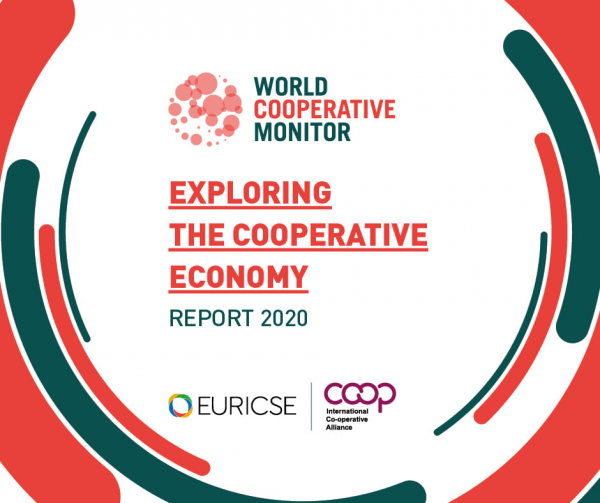
The 2020 issue of the World Cooperative Monitor (WCM) exploring the economic and social impact of the largest cooperatives and mutuals worldwide, was launched on 20th January 2021. The virtual event was attended by over 200 participants from around the world. The recording of the webinar is available here.
48 cooperatives and mutual enterprises (CME) in the Top 300 ranking by Turnover/GDP per capita were reported from the Asia and Pacific region – Japan 26, New Zealand 7, India 5, Republic of Korea 4, Australia 2, Singapore 2, Malaysia 1 and Saudi Arabia 1. Six of these within the global top 10 rankings by Turnover/GDP per capita – IFFCO and Gujarat Cooperative Milk Marketing Federation from India; Zenkyoren, Zen-Noh and Nippon Life from Japan; and Nonghyup (NACF) from the Republic of Korea! Per capita GDP is a metric that breaks down a country's GDP per person and is calculated by dividing the GDP of a country by its population. The ratio of turnover over GDP per capita measures the turnover of the Top 300 CMEs in terms of the purchasing power of an economy, relating the turnover of the enterprise to the wealth of the country.
CMEs from the Asia and Pacific region also achieved top sectoral ranks
Agriculture and Food Industries
Among the rankings for cooperatives that operate along the entire agricultural value chain, six out of the top 10 were from the Asia-Pacific region. This sector includes both agricultural producers’ cooperatives and consortia of cooperatives (or similar arrangements) that carry out the processing and marketing of agricultural goods for their members.

Industry and Utilities
Among the rankings for cooperatives that operate in industrial sectors, two out of the top 10 were from the Asia-Pacific region. This sector includes worker cooperatives in the construction sector and users’ cooperatives in the utilities’ sector, that is, cooperatives that are active in the management of infrastructure for public services such as electricity, natural gas, and water.

Insurance
Among the rankings for cooperatives that operate in insurance sectors, four out of the top 10 were from a single country within the Asia-Pacific region. This sector includes mutual organisations and cooperatives owned and democratically controlled by their insured customers.

Financial Services
Among cooperatives that operate in the financial services sector, one out of the top 10 was from the Asia-Pacific region. This sector includes cooperative banks and credit unions providing banking and financial intermediation services, democratically controlled by member customers (borrowers and depositors).

Education, Health and Social Work
Among cooperatives which manage educational, health or social services, three out of the top 10 were from the Asia-Pacific region. These include consumer (user), producer (provider) and multistakeholder social and health cooperatives that provide high-quality, cost-effective community health care & social services.

Other services
Among cooperatives that provide services other than those included in education, health and social work, including housing, cooperative business services, communications and transportation, 1 out of the top 10 rankings was from the Asia-Pacific region.

Regional Landscape
The 46 CMEs from the Asia-Pacific region in the Top 300 by turnover ranking (data reference year 2018) have a turnover of USD 423.85 billion, with the agricultural (17 enterprises) and insurance sectors (14 enterprises) dominating the list. The wholesale and retail trade (8 enterprises) followed by the financial service (4 enterprises) represent the third and the fourth biggest economic sectors. In terms of cooperative type, almost half of these are producer cooperatives (20 enterprises) mainly representing agricultural and retailers’ cooperatives. Consumer/user cooperatives (16 enterprises) and mutuals (7 enterprises) mainly composed of consumer cooperatives and financial service cooperatives represent the other half. No worker cooperatives or multi-stakeholder cooperatives are included in the turnover ranking from the region.



Each year, the WCM builds upon the research and data collection of the previous years, continually refining and improving methodology and data collection strategies. There are many challenges in comparing organisations across countries with different legal frameworks and standards. Working with partners and federations from across the globe, the team is able to construct a scientifically robust and informative report.



